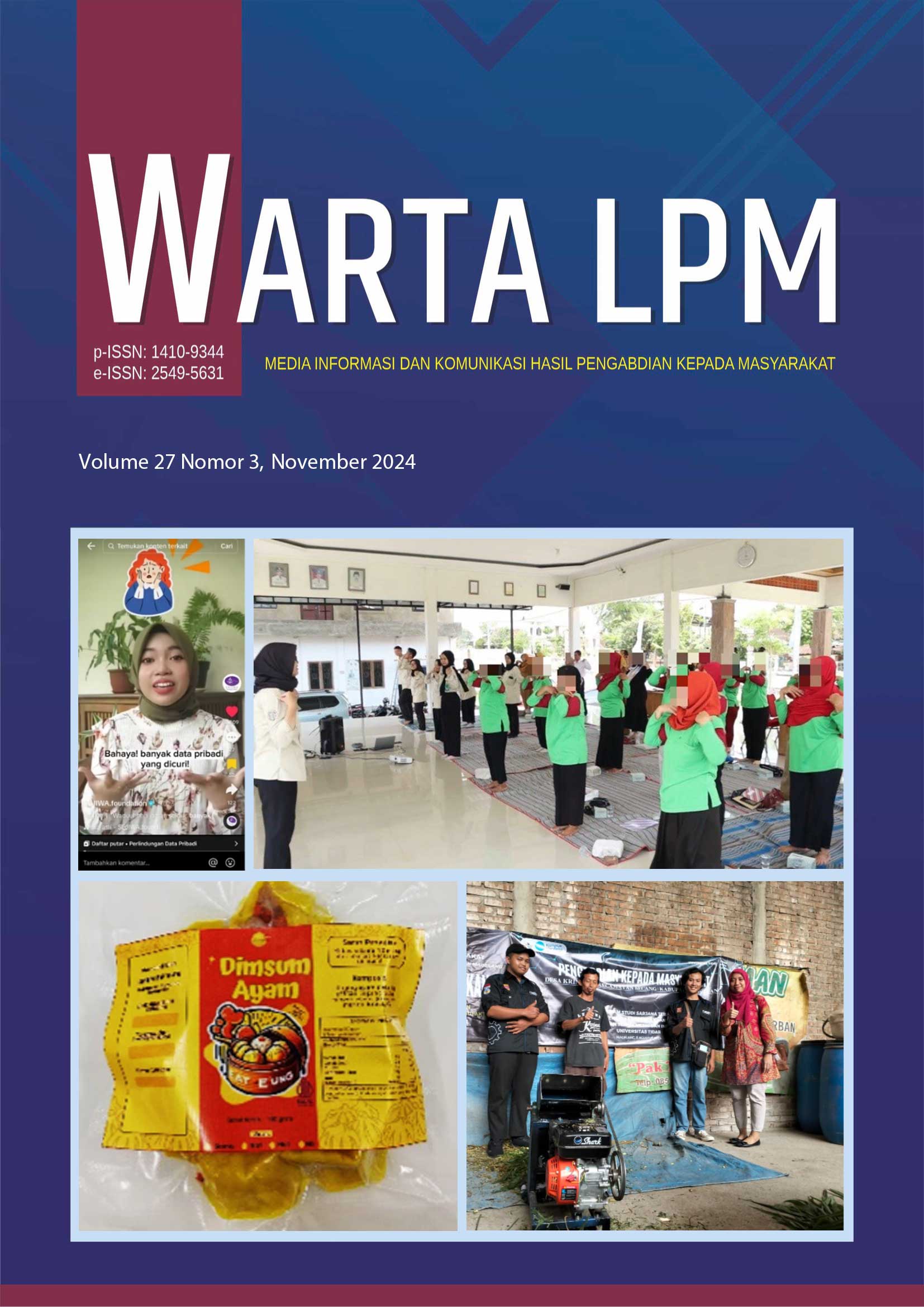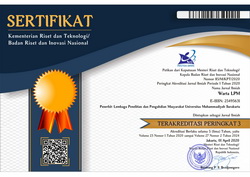Evaluasi Status Gizi Siswa SDN 1 Sikunang, Wonosobo, melalui pengukuran Antropometri dengan WHO AnthroPlus
DOI:
https://doi.org/10.23917/warta.v27i3.4803Keywords:
nutritional status, student, WHO AnthroPlus, anthropometryAbstract
Students of SDN 1 Sikunang, Wonosobo habitually consume unhealthy foods that affect their nutritional status, which is intervened by their lifestyle, parenting, and the unhealthy food condition of the school canteen. It is proven by 30.3% of students in grades 4-6 have abnormal nutritional status. Therefore, it requires an assessment of nutritional status by anthropometric measurement of body mass index based on age to all students. This community service aims to measure the level of nutritional status of students at SDN 1 Sikunang and can be implemented by the school in the long term. A total of 114 students were measured anthropometrically using analog weight scales and microtoise to determine body mass index. The data was analyzed together with the age data of each student utilizing WHO AnthroPlus to determine the level of IMT/U nutritional status. From this activity, 3.5% of students were found to have severely thinness, 9.7% of students with thinness, 73.7% with normal nutrition, 4.4% with overweight, and 3.5% as obese. These results indicate that 26.3% of students at SDN 1 Sikunang are still classified as having abnormal nutritional status. It is recommended that the nutritional status of these students be routinely monitored by the health unit of SDN 1 Sikunang and informed to parents. In addition, it is recommended that the school commits to implementing a healthy canteen and educating students and parents about balanced nutrition and healthy foods.
Downloads
References
Ali, H., Effendy, N., & Budiarto, R. (2012). Rancang bangun sistem pengukuran putaran sudu turbin dan perekam data berbasis mikrokontroler AVR ATMega16 pada turbin angin di Pantai Baru, Ngentak, Bantul. Applied Science for Technology Innovation (Astechnova).
Ariawan, I. G. N., Prihayanti, N. K. T., Purnama, P. M. D. A., Susanti, I. A., Dharmayanti, N. M. S., Diastuti, N. N. P., & Devi, N. L. P. S. (2021). Faktor-Faktor yang Berhubungan dengan Status Gizi Pada Anak Usia Sekolah di SD 4 Penebel. Dunia Keperawatan: Jurnal Keperawatan Dan Kesehatan, 9(1), 16–28.
Asadullah, M. N., Webb, A., & Islam, K. M. M. (2024). SDG 4 mid-point challenge: Fixing the broken interlinkages between education and gender equality. International Journal of Educational Development, 106, 103015. https://doi.org/10.1016/j.ijedudev.2024.103015
Birru, M. I. A., Dewi, W. M. K., Effendy, N., & Solekhah, T. Y. (2024). Edukasi Bahaya Kecanduan Smartphone dan Tips Menjaga Kesehatan Mata pada Siswa SD Negeri 1 Sikunang, Wonosobo. Wikrama Parahita : Jurnal Pengabdian Masyarakat, 8(1), 95–104. https://doi.org/10.30656/jpmwp.v8i1.7269
Devi, B. & Revathy. (2023). Nutritional status impacting academics among school children in selected schools of North Chennai. Journal of Diabetology, 14(3), 161–165. https://doi.org/10.4103/jod.jod_33_23
Firdaus, E., & Purwanto, G. (2022). Pengukur Tinggi dan Berat Badan Secara Otomatis Menggunakan Sensor Load Cell Serta Ultrasonik dengan IoT. KRESNA: Jurnal Riset Dan Pengabdian Masyarakat, 2(2), 222–231.
Gong, M., Yu, K., Zhou, C., Liu, Z., Xu, Z., Xu, M., & Qu, S. (2024). SDG space: Revealing the structure and complementarities among sustainable development goals in China. Fundamental Research. https://doi.org/10.1016/j.fmre.2024.01.005
Hadi, P., & Karim, D. Z. M. (2021). Nutritional Status and Sedentary Lifestyle of Individuals A review. International Journal of Modern Agriculture, 10(2), 1690–1699.
Ishud, N. K., & Romadona, N. F. (2020). A Review of The Effect of Nutritional Status on Gross Motor Skills of Early Childhood. The 2nd International Conference on Elementary Education, 2(1), 664–674.
Johnsunderraj, S., Francis, F., & Prabhakaran, H. (2023). Child-to-child approach in disseminating the importance of health among children –A modified systematic review. Journal of Education and Health Promotion, 12(1), 116. https://doi.org/10.4103/jehp.jehp_8_23
Kuzik, N., Da Costa, B. G. G., Hwang, Y., Verswijveren, S. J. J. M., Rollo, S., Tremblay, M. S., Bélanger, S., Carson, V., Davis, M., Hornby, S., Huang, W. Y., Law, B., Salmon, J., Tomasone, J. R., Wachira, L.-J., Wijndaele, K., & Saunders, T. J. (2022). School-related sedentary behaviours and indicators of health and well-being among children and youth: A systematic review. International Journal of Behavioral Nutrition and Physical Activity, 19(1), 40. https://doi.org/10.1186/s12966-022-01258-4
Milton, S., & Alhamawi, M. (2024). Peace-centred sustainable development: An analysis of SDG 16 in the Arab states. World Development Perspectives, 34, 100587. https://doi.org/10.1016/j.wdp.2024.100587
Morales, F., Montserrat-de La Paz, S., Leon, M. J., & Rivero-Pino, F. (2023). Effects of Malnutrition on the Immune System and Infection and the Role of Nutritional Strategies Regarding Improvements in Children’s Health Status: A Literature Review. Nutrients, 16(1), 1. https://doi.org/10.3390/nu16010001
Muchtar, F., Rejeki, S., & Hastian, H. (2022). Pengukuran dan penilaian status gizi anak usia sekolah menggunakan indeks massa tubuh menurut umur. Abdi Masyarakat, 4(2). https://doi.org/10.58258/abdi.v4i2.4098
Mukhamedzhanov, E., Tsitsurin, V., Zhakiyanova, Z., Akhmetova, B., & Tarjibayeva, S. (2023). The Effect of Nutrition Education on Nutritional Behavior, Academic and Sports Achievement and Attitudes. International Journal of Education in Mathematics, Science and Technology, 11(2), 358–374. https://doi.org/10.46328/ijemst.3133
Novianti, A., & Utami, T. P. (2021). Penilaian Status Gizi dan Pengetahuan Gizi Seimbang Anak Usia Sekolah Sebagai Bentuk Aktivasi Kegiatan UKS. ABDIMAS: Jurnal Pengabdian Masyarakat, 4(1), 399–404. https://doi.org/10.35568/abdimas.v4i1.908
Purwani, E., & Muwakhidah. (2016). Peningkatan Pengetahuan Anak SD Melalui Edukasi Gizi Tentang Makanan Jajanan Sehat dan Gizi Seimbang dengan Media Buku Cerita Bergaber di SD Tiyaran 01 dan 03. WARTA LPM, 19(2), 105-109. https://doi.org/10.23917/warta.v19i2.2754
Putri, M. K., Isfanda, I., Evand, H., Supandi, A., & Utami, F. M. (2022). Evaluasi status gizi pada anak usia sekolah dasar di Kota Sigli. Prosiding Seminar Nasional Biologi, Teknologi Dan Kependidikan, 10(2), Article 2. https://doi.org/10.22373/pbio.v10i2.15274
Resmiati, & Putra, M. E. (2021). Akurasi dan Presisi Alat Ukur Tinggi Badan Digital Untuk Penilaian Status Gizi. Jurnal Endurance: Kajian Ilmiah Problema Kesehatan, 6(3), 616–621. https://doi.org/10.22216/endurance.v6i3.580
Wardana, I. N. K., Antariksa, A., & Effendy, N. (2008). Perancangan Sistem Pakar untuk Diagnosa Penyakit Mulut dan Gigi Menggunakan Bahasa Pemrograman Clips. Seminar Nasional Aplikasi Teknologi Informasi (SNATI). https://journal.uii.ac.id/Snati/article/view/757
Zein, R. M., Effendy, N., Basuki, E., & Nopriadi, N. (2024). A design of a brain tumor classifier of magnetic resonance imaging images using ResNet101V2 with hyperparameter tuning. IAES International Journal of Artificial Intelligence (IJ-AI), 13(3), 3141–3146. https://doi.org/10.11591/ijai.v13.i3.pp3141-3146
Downloads
Submitted
Accepted
Published
How to Cite
Issue
Section
License
Copyright (c) 2024 Warta LPM

This work is licensed under a Creative Commons Attribution 4.0 International License.















